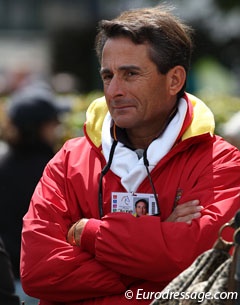
The International Dressage Riders Club (IDRC) has lost the appeal they filed with the FEI Tribunal on exclusively nominating a rider's representative for the FEI Dressage Committee.
The Tribunal dismissed the appeal because the FEI Rules are not "absolutely clear in this respect," said Prof. Dr. Jens Adolphsen on behalf of the FEI Tribunal Panel. "An exclusive right, if intended, must be clear and unambiguous."
The current dispute between the IDRC and FEI Dressage Committee arose when the IDRC as well as two National Federations each proposed a candidate to the DC for the Athlete representative position, which freed up after Margit Otto-Crepin's tenure on the DC expired. The IDRC believed that Article 29.10 of the FEI Statutes granted them exclusive right to propose candidates for the position, while the FEI's view is that the Dressage Committee itself, national federations, and the FEI Bureay may also propose candidates.
The IDRC's view is that Article 29.10 creates an exclusive class with the right to propose a candidate with the IDRC being the exclusive class since it is the FEI recognised international Athletes' association for dressage. The FEI Dressage committee decided to nominate the candidate of the Spanish Equestrian Federation, Luis Lucio, a long-time IDTC member, instead of the IDRC nominee Wayne Channon, the IDRC's secretary-general.
The FEI Tribunal decided that there are only two possible interpretations of Article 29.10 of the FEI Statutes. The first possible interpretation is that any of the listed bodies can propse a candidate as the Athlete or Organizer representative on the Dressage Committee, and the second is that only the recognised association can propose a candidate.
"The two interpretations cannot co-exist and there the FEI Tribunal must decide which is correct," the official report stated. The Tribunal admitted that the language in the rules is not clear and is ambigious.
"The FEI has demonstrated that it knew how to draft an exclusive right but declined to do so. However, the FEI was unable to present any evidence explaining the reasons why the clause guaranteeing the exlusive right to the IDRC was not adopted and for that reason the Tribunal finds that this dispute cannot be decided on that basis."
The Tribunal looked at the overall regulatory system to decide upon the issue. The current Article 6.5.2. (ii) of the Internal Regulations of the FEI was key in this decision. "That article guarantees that the Dressage Committee includes a "member" of the IDRC but it stops short of giving the IDRC the exclusive right to determine which member that will be. (...) It is difficult for the FEI Tribunal to accept that there was an intention to deprive National Federations, who form the FEI General Assembly which is the supreme authority of the FEI, of the right to even "propose" candidates to be the Athlete's representative of the Dressage Committee."
IDRC Secretary-General Wayne Channon Reacts to the Tribunal Decision
 The IDRC is not surprised by the Tribunal’s decision although we are disappointed. We knew the burden of proof was with us and we believe we provided more than reasonable doubt over the FEI’s interpretation.
The IDRC is not surprised by the Tribunal’s decision although we are disappointed. We knew the burden of proof was with us and we believe we provided more than reasonable doubt over the FEI’s interpretation.
What we aimed to do, and believe we have done, is alert the dressage world to the fact that riders have a problem with proper representation on the Dressage Committee.
There may be a rider sitting on the Dressage Committee but they do not necessarily represent riders.
The judge took the view that if the FEI had wanted to give the IDRC exclusive rights this would have been made this clear in the drafting of the Internal Regulations. He could equally have made the opposite assumption that as the FEI did not make it clear that it did not want the IDRC to have exclusive rights then this would have been made clear.
Evidence that the FEI’s interpretation was wrong, and that our understand was a more logical interpretation, is shown in the September 2006 draft of the Internal Regulations. Here the IDRC was clearly given the exclusive right to nominate the rider. In that draft, each standing committee (jumping, eventing etc) had different rights. When the final draft was adopted in November 2006 all the disciplines were distilled into one paragraph and this was not drafted as clearly. The judge assumed this was a deliberate change. This is unlikely as there had been no policy changes between September and November.
Based on the judge’s instruction that the FEI should redraft the current rules so that the meaning is unambiguous it now falls to the FEI and the National Federations to take a decision on the real meaning and draft the rules accordingly.
This is a chance for the FEI and National Federations to demonstrate their commitment to the Athlete in equestrian sport and give us the basic rights of democracy that they demand and enjoy.
Photos © Astrid Appels
Related Links
The full FEI Tribunal text of the final decision can be read here.
IDRC to Take FEI to Appeal over Appointment to Dressage Committee